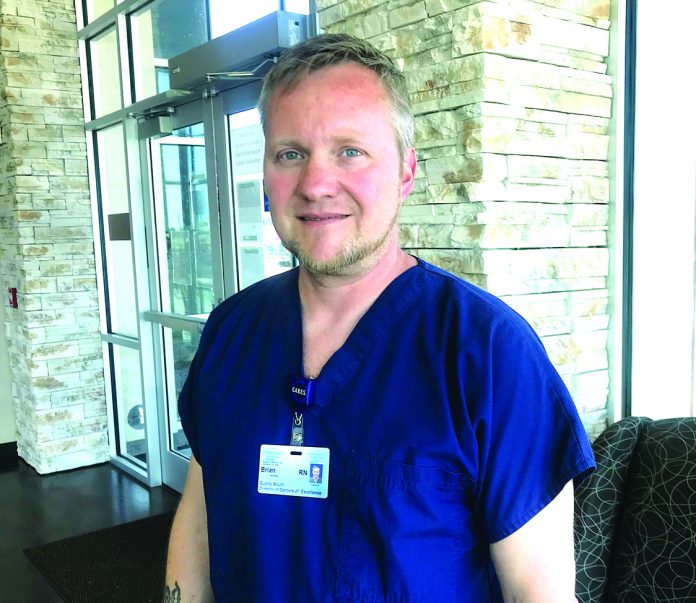
story and photo by James Coburn, Staff Writer
Brian Harding played a lot of sports growing up. Every time somebody would get hurt, he felt compelled to run over and ask if there was anything he could do to help. He observed a lot of trainers in sports medicine.
“I was always inspired by them, knowing what questions to ask so they could figure out what happened to the player,” said Harding, RN, director of Centers of Excellence at Community Hospital North, located in Oklahoma City. “I was always inspired by that. So, when I was getting older and getting out of high school, I was figuring out what to do. And I was like, ‘I’d like to do something medical. I would say that’s where it came from.’”
Today, his career focuses on lower extremity joint replacement surgeries for hips and knees. He coordinates the care and makes sure patients are educated about the entire process of surgery and their recovery. (story continues below)
ADvantage Registered Nurse Temp Full time
VIEW HERE: https://oknursingtimes.com/jobs/job/advantage-registered-nurse-temp-full-time/
Harding is responsible for submitting all relevant tracking information to the Centers for Medicare & Medicaid Services.
He is a 2001 graduate of OSU/OKC in Oklahoma City. A few years later his nursing career was interrupted to serve his country when he was called by the National Guard to serve in the war in Iraq. His nursing career has encompassed surgery, trauma and ICU nursing at OU Medical Center while also working part time at Oklahoma Center for Orthopedic & Multi-Specialty Surgery in a case management role for orthopedics, and post anesthesia care.
He was at OCOM in 2016 when the Centers for Medicare & Medicaid Services developed the Comprehensive Care for Joint Replacement (CJR) Model to improve care for Medicare patients undergoing hip and knee replacements. He accepted a new management position with CJR until his capacity was eliminated during the COVID-19 pandemic in 2020. He had enjoyed his field of nursing and began searching for a similar role.
Harding was hired as the recovery room manager at Community Hospital when an opening for his present job as the director of Centers of Excellence was offered to him there. Harding fell in love with Community Hospital after seeing how the physicians and nurses are friendly and work well with one another, he said.
Harding works directly with case managers, especially when notified that a patient has not had all their pre-admission testing done. Patients that are healthy enough may need a joint replacement. The patients he encounters cannot get around like they used to do. They must use a walker, a wheelchair or a cane while living with chronic pain every day.
“Maybe they used to like to garden or go for walks and hikes,” Harding continued. “They can’t do that because of that pain and it’s holding them back from doing the things that help them live a fun, fulfilled life.”
He recalled conducting a pre-operative class and explaining how to prepare their houses against any prevailing hazards that could impact their recovery. It’s important to clear pathways and prepare meals in advance of a knee or hip replacement surgery.
“That way after your surgery, if you don’t live with anybody, you’re not up in the kitchen standing on one leg trying to cook a meal,” he explained.
On the day of surgery, he explains everything that happens, including knee and hip replacement models.
He recalled one day after one of his classes when an elderly woman came to him saying she was so glad she came to the class. She had been afraid.
“When she learned she needed to have her knee replaced, she thought they were going to cut-off the bottom of her thigh bone, cut off the top of her shin bone and replace it with metal and plastic mechanics,” Harding said.
He explained that a knee surgery basically provides what is like a bottle cap on the lower femur bone and another at the bottom of the shin bone with the spacer in-between.
“She said, ‘That really helped relieve me. I was nervous about this. Your explanation of everything really helped me.’ Maybe it’s not saving lives but it’s putting patients’ minds at ease, helping them to understand what to expect throughout this whole process,’” Barton said.
Barton knows how to balance his days at work with fun and relaxation. He has an 8-year-old son. So, they spend father-and-son time going fishing or bicycle riding. Barton also coaches his son’s soccer team. Sometimes, Barton and his wife take their son camping.
“We go on family trips. He likes watching monster trucks. We’ve gone down to Florida a couple of times and watched the big finals in open stadiums where there’s like 12 or 15 different vehicles coming in to compete.”













